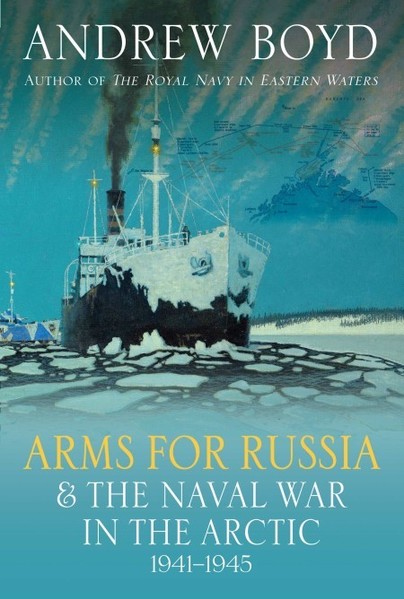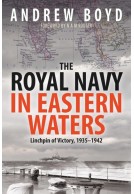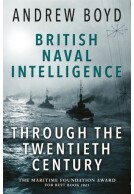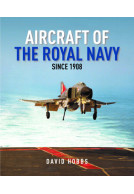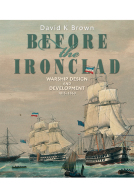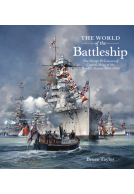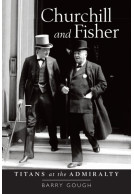Arms for Russia & The Naval War in the Arctic, 1941–1945 (Hardback)
(click here for international delivery rates)
Need a currency converter? Check XE.com for live rates
| Other formats available | Price |
|---|---|
| Arms for Russia & The Naval War… ePub (9.0 MB) Add to Basket | £19.99 |
This major new work fundamentally reassesses the operations by the Western allies to deliver war supplies to Russia via the Arctic sea route between 1941 and 1945. It explores the motives underpinning Western aid, its real impact on the Soviet war effort, and its influence on wider Allied and German strategy as the war developed. It brings to life key participants, political and military, describes the interaction of intelligence with high policy and tactics, and brings a fresh perspective to key events, including the notorious convoy PQ 17.
The book disputes the long-standing view that aid to Russia was essentially discretionary, lacking military rationale and undertaken primarily to meet political objectives, with only a minor impact on Soviet war potential. It shows that aid was always grounded in strategic necessity, with the Arctic supply route a constant preoccupation of British and American leaders, absorbing perhaps twenty per cent of Royal Navy resources after 1941 and a significant share of Allied merchant shipping badly needed in other theatres. The Soviet claim, determinedly promoted through the Cold War, that aid was marginal, still influences attitudes in Vladimir Putin’s Russia and contemporary Western opinion. It even resonates through the present war in Ukraine. Andrew Boyd demonstrates that in reality, Western aid through the Arctic was a critical multiplier of Soviet military power throughout the war and perhaps even enabled Russia’s very survival in 1942; and he makes plain that the British contribution to the aid effort was greater than generally acknowledged.
The book also emphasises that the Arctic conflict was not framed solely by the supply convoys, important though they were. British, German and Russian operations in a theatre – defined by Adolph Hitler in early 1942 as the ‘zone of destiny’ – were shaped by other perceived opportunities and threats. For instance, Germany concentrated its fleet in Norway to forestall a potential British attack while attempting land offensives to cut Russia’s links with its northern ports. It also had vital raw materials to protect. Britain explored potential operations with Russia to dislodge Germany from the Arctic coast and sever her access to important resources.
Elegantly written written and incorporating many new perspectives on the Arctic theatre, this new work should find a place on the shelves of every historian, scholar and enthusiast whose interests extend to the Russian dimension of the Second World War.
'Boyd has produced yet another definitive account that helps reshape perceptions.'
Warships International Fleet Review - May 2025 Issue
"This book, with its aim to challenge previous conceptions, provides a thoroughly researched and most detailed analysis of the Arctic supply route, drawing on sources from Russia, America, the UK and Germany. At nearly 600 pages, with only a few B&W images and illustrations, it is not for the faint-hearted; however, I contend that it is well worth the effort! The narrative is both well-written and informative, and the truly impressive footnotes and bibliography are a testament to the academic level of research that has gone into the production of a convincing hypothesis and a gripping read, by an impressive author."
The Naval Review
Read the full review here
As featured in
The journal of the Trinity House Service - FLASH No 42, Spring 2025 edition
"With comprehensive notes, equally comprehensive index, maps, illustrations and very use glossary of terms and abbreviations this is a superb work of scholarship on a very complex aspect of WW2. I highly recommend this book to anyone with an interest in naval history especially the lesser know aspect of WW2 naval history."
Martin Willoughby, The Wessex Branch of the Western Front Association
"Overall, this book is a fantastic work of historical scholarship and comes highly recommended for anyone interested in naval history."
Britain at War Magazine - February 2025
'It is hard to imagine that Boyd's comprehensive account will be superseded. No one writing on the subject in future will be able to ignore it, and anyone with the smallest interest in the war will want to read it'.
The Spectator
Read the full review here.
"...an outstanding work of historical scholarship that deserves a place on the shelf of anyone with an interest in naval history or the development of modern naval methods of command and control using a variety of intelligence sources to maximum effect."
Australian Naval Institute
Read the full review here
‘A timely, original and compelling reassessment’
Mark Harrison, Emeritus Professor of Economics, University of Warwick
‘Andrew Boyd’s richly detailed new study explains how essential was the contribution the Western Allies made to saving Russia from German invasion. More than that, he supplies an important corrective to received opinions by showing how the major sea campaigns were not separate theatres of war but closely tied together.’
Professor Nicholas Rodger, author of The Naval History of Britain
‘Readers familiar with Andy Boyd’s work will expect a new and challenging assessment of this complex campaign: they will not be disappointed.’
Professor Andrew Lambert, King’s College, London
'There are still arguments over whether aid to the Soviet Union mattered in World War Two, but Andrew Boyd convincingly shows not only that it did, but that the dangerous route in the Arctic took much more of the credit in the early years of aid than is usually acknowledged. This will be an indispensable guide to just what the Arctic convoys achieved.'
Richard Overy, Honorary Professor of History, University of Exeter
"A great work that will be a reference in Global World War II strategy especially Naval strategy."
Mathieu Gaudreault - Goodreads
5 Stars
About Andrew Boyd
ANDREW BOYD CMG, OBE, DPhil was educated at Britannia Royal Naval College and St Johns College, Oxford. He served as a submariner in the Royal Navy before joining the Foreign & Commonwealth Office in 1980. He has had a long standing interest in 20th-century naval history and was awarded a research fellowship to undertake a DPhil. This was the basis of his first book, The Royal Navy in Eastern Waters, which was followed by the critically-acclaimed British Naval Intelligence through the Twentieth Century. His most recent book, Arms for Russia and the Naval War in the Arctic 1941–1945, is a fascinating reassessment of Allied support for the Soviets.







